(完整版)一般将来时用法说明
一般将来时用法总结
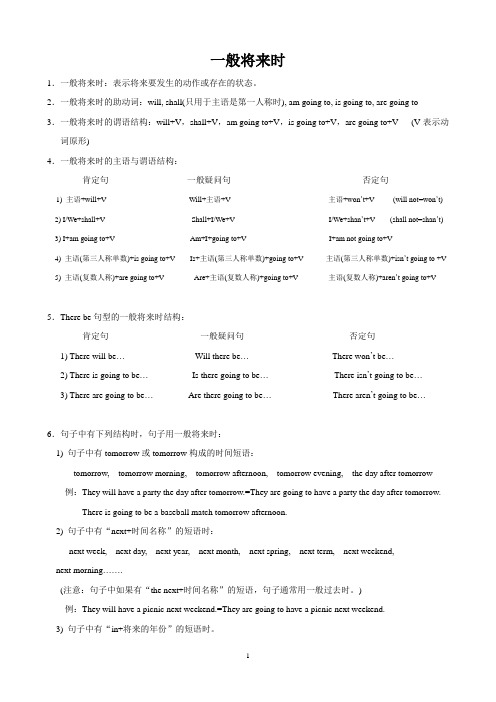
一般将来时1.一般将来时:表示将来要发生的动作或存在的状态。
2.一般将来时的助动词:will, shall(只用于主语是第一人称时), am going to, is going to, are going to3.一般将来时的谓语结构:will+V,shall+V,am going to+V,is going to+V,are going to+V (V表示动词原形)4.一般将来时的主语与谓语结构:肯定句一般疑问句否定句1) 主语+will+V Will+主语+V 主语+won’t+V (will not=won’t)2) I/We+shall+V Shall+I/We+V I/We+shan’t+V (shall not=shan’t)3) I+am going to+V Am+I+going to+V I+am not going to+V4) 主语(第三人称单数)+is going to+V Is+主语(第三人称单数)+going to+V 主语(第三人称单数)+isn’t going to +V5) 主语(复数人称)+are going to+V Are+主语(复数人称)+going to+V 主语(复数人称)+aren’t going to+V5.There be句型的一般将来时结构:肯定句一般疑问句否定句1) There will be…Will there be…There won’t be…2) There is going to be…Is there going to be…There isn’t going to be…3) There are going to be…Are there going to be…There aren’t going to be…6.句子中有下列结构时,句子用一般将来时:1) 句子中有tomorrow或tomorrow构成的时间短语:tomorrow, tomorrow morning, tomorrow afternoon, tomorrow evening, the day after tomorrow 例:They will have a party the day after tomorrow.=They are going to have a party the day after tomorrow.There is going to be a baseball match tomorrow afternoon.2) 句子中有“next+时间名称”的短语时:next week, next day, next year, next month, next spring, next term, next weekend,next morning…….(注意:句子中如果有“the next+时间名称”的短语,句子通常用一般过去时。
一般将来时的用法详解
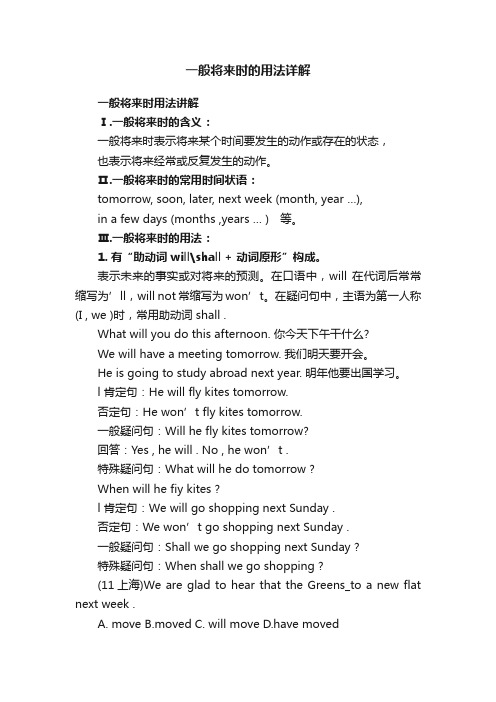
一般将来时的用法详解一般将来时用法讲解Ⅰ.一般将来时的含义:一般将来时表示将来某个时间要发生的动作或存在的状态,也表示将来经常或反复发生的动作。
Ⅱ.一般将来时的常用时间状语:tomorrow, soon, later, next week (month, year …),in a few days (months ,years … )等。
Ⅲ.一般将来时的用法:1. 有“助动词 will\shall + 动词原形”构成。
表示未来的事实或对将来的预测。
在口语中,will 在代词后常常缩写为’ll,will not 常缩写为won’t。
在疑问句中,主语为第一人称(I , we )时,常用助动词 shall .What will you do this afternoon. 你今天下午干什么?We will have a meeting tomorrow. 我们明天要开会。
He is going to study abroad next year. 明年他要出国学习。
l 肯定句:He will fly kites tomorrow.否定句:He won’t fly kites tomorrow.一般疑问句:Will he fly kites tomorrow?回答:Yes , he will . No , he won’t .特殊疑问句:What will he do tomorrow ?When will he fiy kites ?l 肯定句:We will go shopping next Sunday .否定句:We won’t go shopping next Sunday .一般疑问句:Shall we go shopping next Sunday ?特殊疑问句:When shall we go shopping ?(11上海)We are glad to hear that the Greens_to a new flat next week .A. moveB.movedC. will moveD.have moved( ) Who _____ we ____ swimming with tomorrow afternoon?A. will; goB. do; goC. will; goingD. shall; go2. 由“be going to + 动词原形”构成。
完整版一般将来时时态用法讲解

般将来时时态1. 一般将来时的定义一般将来时表示在现在看来即将要发生的动作或存在的状态。
常用时间副词tomorrow, soon 或短语n ext year / week / mon th, in a few days, in the future, sometime 做状语。
如:What will you do this afternoon ? 你今天下午干什么?We will have a meet ing tomorrow. 我们明天要开会。
He is going to study abroad (到国外) next year.明年他要出国学习。
2. 一般将来时的结构及应用(1) shall / will + 动词原形。
表示即将发生的动作或存在的状态。
特别是表示客观性的事情或在某条件下要发生的事情,只能用此结构。
如:What shall we do if he doesn '如果他不?来,我们该怎么办?Will you be free this evenin g? 今天晚上有空吗?I think he will tell us the truth (真相)。
我想他会告诉我们真实情况的。
(2) be going to +动词原形。
表示已经计划或安排好了的事情,也可表示有迹象表明肯定要发生的事情。
如:We are going to have a meeting to discuss (讨论)the matter this evening. 今天晚上开会讨论这件事情。
Look at the black clouds over there. I think it is going to rain soon. 看一看那边的乌云,我想天要下雨了。
There is going to be an En glish evening this week. 本周要举行一个英语晚会。
(3) be +现在分词。
完整版)一般将来时基本用法
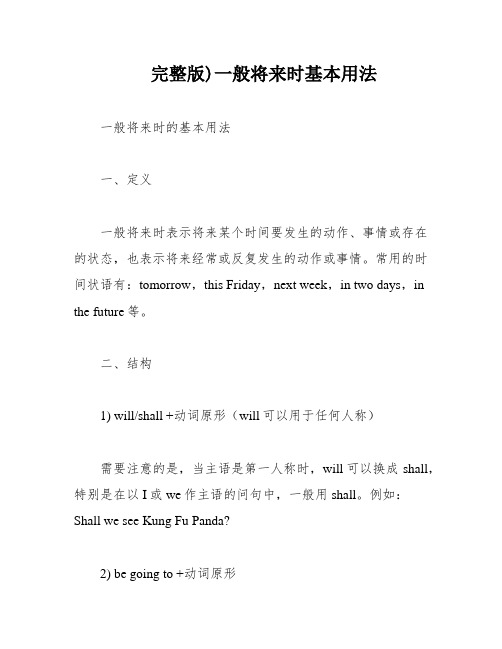
完整版)一般将来时基本用法一般将来时的基本用法一、定义一般将来时表示将来某个时间要发生的动作、事情或存在的状态,也表示将来经常或反复发生的动作或事情。
常用的时间状语有:tomorrow,this Friday,next week,in two days,in the future等。
二、结构1) will/shall +动词原形(will可以用于任何人称)需要注意的是,当主语是第一人称时,will可以换成shall,特别是在以I或we作主语的问句中,一般用shall。
例如:Shall we see Kung Fu Panda?2) be going to +动词原形例如:I’m going to play the piano。
be going to和will的区别be going to和will的用法虽然都表示将来发生动作或情况,一般情况下能互换。
但它们的用法是有区别的。
be going to主要用于:1、表示事先经过考虑、安排好打算、计划要做的事情。
例如:Dad and I are going to watch an opera this afternoon.2、表示根据目前某种迹象判断,某事非常有可能发生。
例如:Look。
There come the dark clouds。
It is going to rain.三、一般疑问句和否定句一般疑问句:1) will/shall +动词原形(will可以用于任何人称)——在will后加not2) be going to +动词原形——在be后加not例如:She will come back in three days.Will she not come back in three days?They are going to clean their classroom.Are they not going to clean their classroom?否定句:1) will/shall +动词原形(will可以用于任何人称)——将will提前2) be going to +动词原形——将be提前例如:She will come back in three days.She will not come back in three days.Will she come back in three days?XXX is whether they will actually do it。
(完整版)一般将来完成时的用法详解

(完整版)一般将来完成时的用法详解一般将来完成时的用法详解
一般将来完成时是英语中的一种时态,用于表示将来某个时间点之前已经完成的动作或情况。
下面将详细介绍一般将来完成时的用法。
构成
一般将来完成时由将来时态的助动词 "will" 或 "shall"、"have" 和动词的过去分词构成。
肯定句结构:
主语 + will/shall + have + 过去分词
否定句结构:
主语 + will/shall + not + have + 过去分词
疑问句结构:
Will/Shall + 主语 + have + 过去分词 + 其他?
用法
一般将来完成时主要用于以下几种情况:
1. 表示将来某个时间点之前已经完成的动作或情况。
- I will have finished my homework by the time you arrive.
- By tomorrow, they will have already left for their trip.
2. 表示对未来某个时间点的预测。
3. 表示对过去某个时间点的未来完成的猜测。
- He will have passed the exam yesterday.
注意事项
1. 一般将来完成时通常用于将来时间点之前的动作或情况,因此在句子中应明确指出相关的时间点。
2. 一般将来完成时也可以与其他将来时态连用,如将来进行时、将来完成进行时等,以表达更复杂的时间关系和语义。
希望以上解释对您有所帮助。
如果您有任何疑问,请随时向我
提问。
动词时态一般将来时的用法

动词时态一般将来时的用法动词时态包含了多种不同的形式,每种形式都传达了特定的时间信息。
在英语中,一般将来时是用来表达将来发生的动作、事件或状态的。
本文将详细介绍一般将来时的用法,并提供一些例句来帮助读者更好地理解。
一、一般将来时的定义一般将来时是用来表达明确的将来发生的动作或状态。
通常使用的助动词是will或shall,根据主语的不同而定。
二、一般将来时的构成1. 肯定句结构:主语 + will + 动词原形例如:- I will go shopping tomorrow.- He will travel to Europe next week.2. 否定句结构:主语 + will + not + 动词原形,或主语 + won't + 动词原形例如:- She will not visit her grandparents this weekend.- They won't attend the party.3. 疑问句结构:Will + 主语 + 动词原形?例如:- Will you join us for dinner?- Will they arrive on time?三、一般将来时的用法1. 表达自愿或意愿一般将来时常常用来表达主观上的决定、打算或愿望。
例如:- I will help you with your project.- He will volunteer at the local charity organization.2. 表示未来的计划或安排一般将来时可用于描述预定的时间表或安排。
例如:- We will have a meeting at 9am tomorrow.- They will arrive at the airport in the evening.3. 表示预测或推测有时,我们可以根据现有的证据或情况,使用一般将来时来推测未来可能发生的事情。
一般将来时的使用方法是什么
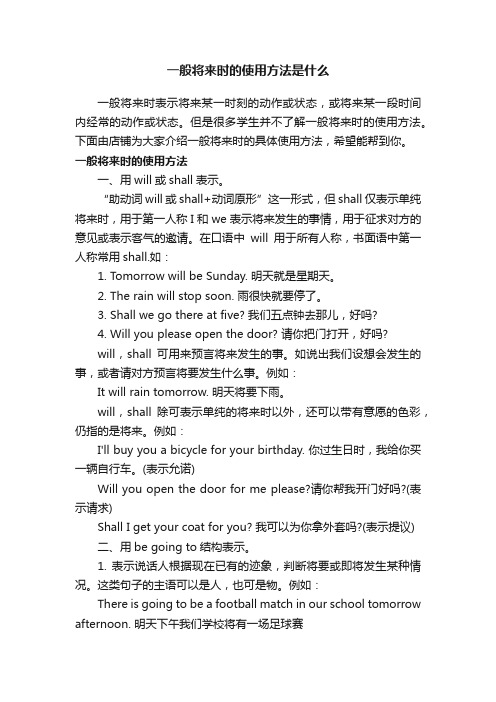
一般将来时的使用方法是什么一般将来时表示将来某一时刻的动作或状态,或将来某一段时间内经常的动作或状态。
但是很多学生并不了解一般将来时的使用方法。
下面由店铺为大家介绍一般将来时的具体使用方法,希望能帮到你。
一般将来时的使用方法一、用will或shall表示。
“助动词will或shall+动词原形”这一形式,但shall 仅表示单纯将来时,用于第一人称I和we表示将来发生的事情,用于征求对方的意见或表示客气的邀请。
在口语中will用于所有人称,书面语中第一人称常用shall.如:1. Tomorrow will be Sunday. 明天就是星期天。
2. The rain will stop soon. 雨很快就要停了。
3. Shall we go there at five? 我们五点钟去那儿,好吗?4. Will you please open the door? 请你把门打开,好吗?will,shall可用来预言将来发生的事。
如说出我们设想会发生的事,或者请对方预言将要发生什么事。
例如:It will rain tomorrow. 明天将要下雨。
will,shall除可表示单纯的将来时以外,还可以带有意愿的色彩,仍指的是将来。
例如:I'll buy you a bicycle for your birthday. 你过生日时,我给你买一辆自行车。
(表示允诺)Will you open the door for me please?请你帮我开门好吗?(表示请求)Shall I get your coat for you? 我可以为你拿外套吗?(表示提议)二、用be going to结构表示。
1. 表示说话人根据现在已有的迹象,判断将要或即将发生某种情况。
这类句子的主语可以是人,也可是物。
例如:There is going to be a football match in our school tomorrow afternoon. 明天下午我们学校将有一场足球赛(已有告示)I feel terrible.I think I'm going to die. 我感到难受极了,我想我快不行了。
(完整版)一般将来时时态用法讲解
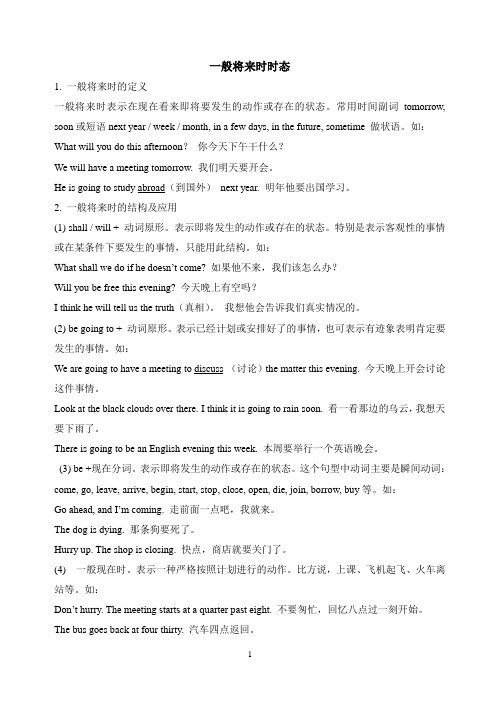
一般将来时时态1. 一般将来时的定义一般将来时表示在现在看来即将要发生的动作或存在的状态。
常用时间副词tomorrow, soon或短语next year / week / month, in a few days, in the future, sometime 做状语。
如:What will you do this afternoon?你今天下午干什么?We will have a meeting tomorrow. 我们明天要开会。
He is going to study abroad(到国外)next year. 明年他要出国学习。
2. 一般将来时的结构及应用(1) shall / will + 动词原形。
表示即将发生的动作或存在的状态。
特别是表示客观性的事情或在某条件下要发生的事情,只能用此结构。
如:What shall we do if he doesn’t come? 如果他不来,我们该怎么办?Will you be free this evening? 今天晚上有空吗?I think he will tell us the truth(真相)。
我想他会告诉我们真实情况的。
(2) be going to + 动词原形。
表示已经计划或安排好了的事情,也可表示有迹象表明肯定要发生的事情。
如:We are going to have a meeting to discuss (讨论)the matter this evening. 今天晚上开会讨论这件事情。
Look at the black clouds over there. I think it is going to rain soon. 看一看那边的乌云,我想天要下雨了。
There is going to be an English evening this week. 本周要举行一个英语晚会。
(3) be +现在分词。
表示即将发生的动作或存在的状态。
- 1、下载文档前请自行甄别文档内容的完整性,平台不提供额外的编辑、内容补充、找答案等附加服务。
- 2、"仅部分预览"的文档,不可在线预览部分如存在完整性等问题,可反馈申请退款(可完整预览的文档不适用该条件!)。
- 3、如文档侵犯您的权益,请联系客服反馈,我们会尽快为您处理(人工客服工作时间:9:00-18:30)。
一般将来时用法说明
1. 基本用法及表示方法
一般将来时的基本用法是表示单纯的将来事实,由“will / shall + 动词原形”构成:
We shall have a lot of rain next month. 下个月将下很多雨。
I think she will pass the exam. 我想他考试会及格的。
2. 表示将来时间的常见方法
英语中除了“will /shall+动词原形”表示将来时态外,还可以有以下多种方法:
(1) 用“be going to+动词原形”表示。
主要表示打算和预测:
We are not going to stay there long. 我们不准备在那里久待。
(表打算) I’m afraid they’re going to lose the game. 恐怕他们会赛输。
(表预测)
Look, it’s going to rain. 瞧,要下雨了。
(表预见)
【注】be going to 后接动词go和come时,通常直接改用其进行时态:Where is he going to go? / Where is he going? 他打算到哪里去?
(2) 用“be to+动词原形”表示。
主要表示按计划或安排即将要发生的动作;有时也表示命令、禁止或可能性:
He is to leave for Beijing tomorrow. 他决定明天去北京。
Tell him he’s not to be back late. 告诉他不准迟回。
(3) 用“be about to+动词原形”表示。
主要表示即将要发生的事:
He is about to leave. 他即将要离开。
Sit down, everyone. The film is about to start. 大家坐好,电影马上就要开始了。
【注】该结构通常不与具体的时间状语连用:
误:He is about to leave soon [tomorrow].
另外,该结构在美国英语中还可表示“打算”(主要用于否定句):
I’m not about to lend him any more money. 我不打算再借给他任何钱。
(4) 用“be due to+动词原形”表示。
主要表示按计划或时间表将要发生某事:
He is due to leave very soon. 他很快就要离开。
His book is due to be published in October. 他的书计划10月份出版。
(5) 用现在进行时(即be+现在分词)表示。
主要表示按计划或安排要发生的事:
The students are leaving on Sunday. 学生们星期日出发。
We’re having a party next week. 我们下星期将开一个晚会。
【注】该用法有时表示即将发生的动作:
I’m leaving. 我走了。
(6) 用一般现在时表示。
表示按规定或时间表预计要发生的事:
The train leaves at 7:25 this evening. 火车今晚7:25分开。
Tomorrow is Wednesday. 明天是星期三。
We have a holiday tomorrow. 我们明天放假。
【注】在表示时间、条件等的状语从句以及某些名词性从句、定语从句等中,也用一般现在时表示将来意义。
